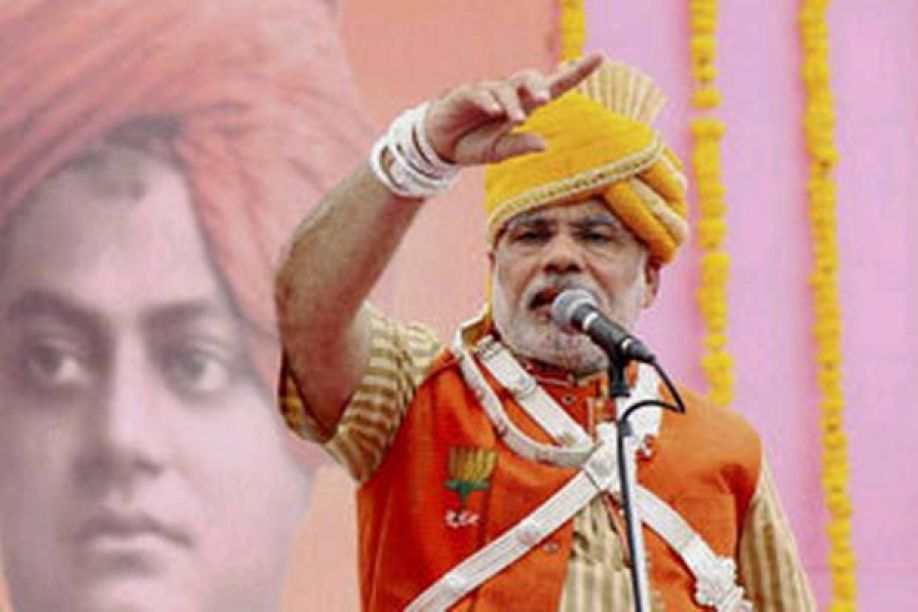NEW DELHI: As the Bharatiya Janata Party (BJP) leads the electoral race the spectre of Nerandra Modi becoming the prime minister of India is beginning to haunt many – not necessarily in India.
Pakistanis are more concerned as they know Modi mostly through bad news. Most Pakistanis hold him responsible for Gujarat riots in 2002.Questions lurk about how Modi will impact India’s secularism; if he will escalate tension between India and Pakistan and roll back the existing confidence-building measures; how he might resort to jingoism in Kashmir, interfere in Balochistan or restart a proxy war in Afghanistan.
But not all Pakistanis think the same way. Tiny Pakistani intellectual elite also sees better chance of détente under a strong BJP leader than was possible under a weak Manmohan Singh. This duality of views was reflected in the recently held India-Pakistan Track-11 dialogue, organised jointly by Sherry Rehman’s Jinnah Institute and Rajmohan Gandhi’s pacifist Centre for Reconciliation and Dialogue in New Delhi.
Kashmiri participants believed that Modi would appease RSS cadres by escalating tensions in Kashmir. The BJP supremo may reverse the ongoing peace initiatives with Pakistan. However, some like businessman Rakesh Vaid opined that India’s foreign policy rested on sound institutional framework and it would not be easy for Modi or anybody to change it drastically.
Other participants did not rule out the possibility of a “Nixon moment” if Modi came to power. The reference was about US President Nixon’s visit to Peking to break ice with China in 1974 (though this heightened the Cold War with the former USSR).
The argument was that, in recent decades, the best peace initiatives with Pakistan were taken by the BJP. Vajpayee’s symbolic visit to the site of Pakistan Resolution at Minar-i-Pakistan in Lahore was meaningful. And so was Advani’s homage to Jinnah’s mausoleum in Karachi. Still others argued that Corporate India has invested heavily in Modi and would like him to maintain peace so that business could flourish.
Not so easy, says senior journalist Vinod Sharma. He believes that if Modi will try to re-invent himself the RSS will not allow him to drift away from core issues. “Modi will have to be a Trapeze artist to appease the two opposing camps,” he said, adding that Modi is sandwiched between his gung-ho rhetoric and the practical compulsions that will come with the job.
The middle way is that Modi will adopt a gradual approach. He will first consolidate himself before risking any change. He may not have problem with trade initiatives with Pakistan but will not touch the core issues in the earlier years of his government. If there is no repeat of Mumbai-style attack, that is.
Most Indians agree that the reaction of the BJP government to a major subversive attack from across the border will be much more drastic.BJP leader Subraminiam Swami did not mince any words about this: “If one Mumbai happens, you can rest assured that a BJP government will react by (orchestrating) six Mumbais.” Scary, isn’t it. This might be a little far-fetched but any major Pakistani provocation will be a sure dead-ender for years in Modi Raj.
A lot will depend on how many seats BJP will win and who will be its allies in a coalition government. A weak coalition will keep him as compromised as Manmohan Singh. Modi’s biggest plank is development and good governance. He is supposed to be a ‘doer’ who will bring back the Indian economy on track. “Indian youth sees in him an iron man, more in the fashion of Margerate Thatcher,” said journalist Rahul Pandita.
“This support is not necessarily because of Hinduvta.” Modi’s reputation of a good administrator will be tested in a coalition government. It was easier in Gujarat because he always had a majority government. Delhi Sarkar will be a different ballgame. The compulsions of a coalition government might pose the biggest challenge to a unilateralist Modi. The problem has compounded in recent years with the states’ ever-growing autonomy, almost bordering on interference in external affairs. A case in point came up when West Bengal’s chief minister Mamta Bannerji stalled India’s border treaty with Bangladesh. Tamil Nadu’s chief minister Jayalalita went a step ahead in pressuring New Delhi to castigate Sri Lanka for not investigating war crimes against Tamils.
So far the BJP offers no policy, as it will shape up only after coalition partners are decided. But one can see the contours of Modi’s leanings here and there. He may have moderated his tone lately but the appeal for Hinduvta remains the crux. Many see subliminal message in selecting Varanasi (Benaras) as Modi’s constituency. Some see it as a spiritual journey from Somnath (in Gujarat) to the shrine of Sarnath near Varanasi. This invokes the Hinduvta underpinnings in Kashi. One will not be surprised if the controversy of Alamgiri Mosque heats up again.
The mosque remains under siege as the next target after Babri Masjid. The fact that the BJP has not given a single ticket to a Muslim in UP, which has 12 per cent Muslim population has compounded the communal moorings of the party.
Therein lies the biggest concern about Modi Raj. The BJP had to replace Advani with Vajpayee to reassure Indian voters and coalition partners about its moderation. But this time around Advani has been replaced by a bigger zealot.Nutshell: Pakistan does not have high hopes from a possible Modi Sarkar – definitely not in near future. Given a chance, Modi may not have time to wait on Pakistan.
The first test will come soon as US draws down its forces in Afghanistan. If India and Pakistan did not forge unity in their policies, as agreed by most participants in the JI-CDF dialogue, this will restart another proxy war that might misdirect the whole agenda.
Published on: thespokesman.pk
Date: Tuesday, 25 March 2014

Share your thoughts